ASU MA Student Dreams of Working for European Parliament
Astrakhan State University closely cooperates with leading European organizations: professional interpreters and translators from the UN and the European Parliament give virtual classes and workshops, and students of the Caspian Higher School of Interpreting and Translation go to Brussels for annual study visits. On the International Day of Parliamentarism, CITS MA student Valentina Alekseenko spoke about the history of formation and activities of one of the main institutions of the EU, which she would like to visit one day.
“Upon entering CITS, I was pleasantly surprised by the training programme. We not only learn to do simultaneous interpretation and improve our language skills, but also to broaden our outlook. It’s important for both professional interpreter and translator to know how the world works. How the internal combustion engine works, why rice paddies affect global warming, who was the first female president – literally everything! And of course, we must know the institutions and organizations we cooperate with,” says the student.
The European Parliament is the heart of the European Union. According to Valentina Alekseenko, to understand what it is, how it operates and what its uniqueness is, one must first look a little deeper into its history.
“After World War II, there were ideas in Europe that one nation could not dominate another. As a result, many powers abandoned the colonial policy pursued on other continents. The reconciliation of once hostile parties on the European territory remained an equally important issue. It took many years before the European Union emerged in its current form which we know it by. It was formally established on November 1, 1993 by the Maastricht Treaty. At present, it consists of 27 states united under one flag and the motto “United in Diversity”. The EU institutions include the European Council, the European Commission, the Council of the European Union (Council of Ministers), the Court of Justice of the European Union, the European Court of Auditors, the European Central Bank and the European Parliament”, says the CITS MA student.
The European Parliament represents the legislative branch of the EU and passes laws together with the Council of Ministers. Citizens of each European Union country can elect their representatives for the European Parliament every five years by direct popular vote. The 705 seats in the Parliament are distributed according to the population of the Member States: large countries have more representatives in the Parliament. Germany is the leader in terms of the number of representatives with 96 seats, while Malta and Luxembourg, for example, have only six seats each. Within the European Parliament, delegates can be divided into factions or be independent representatives. The European People’s Party has been the leading faction for many years. In recent years, however, the Green Party fighting for a priority solution to environmental problems has become a strong competitor.
According to the MA student, the uniqueness of the European Parliament is in its founding principle: during their consideration, the EU laws do not bypass the EU citizens, whose representatives sit in the European Parliament. Throughout the history of the European Union, not only have the functions of the European Parliament never been reduced, but on the contrary, their number has grown. Discussions in the European Parliament take place every day, sessions are divided by topics and are held in three cities: Strasbourg, Brussels and Luxembourg. Discussions are held in 24 languages of the European Union.
“Accordingly, the interpretation and translation unit, through which members of the European Parliament can reach a common decision, has a huge staff of employees. It is with these experts that ASU Caspian Higher School of Interpreting and Translation cooperates. On the basis of the relationship, virtual classes and workshops are held on a regular basis. Every year first-year MA students come to Brussels as part of a study visit to see everything with their own eyes and test themselves in the European Parliament’s interpretation booths. This year, unfortunately, because of the pandemic, the visit did not take place. However, we were offered a virtual tour of the European Parliament, which we were very happy about. I hope that after the lifting of all restrictions I will be able to visit the European Parliament and see everything there with my own eyes”, says Valentina Alekseenko.






